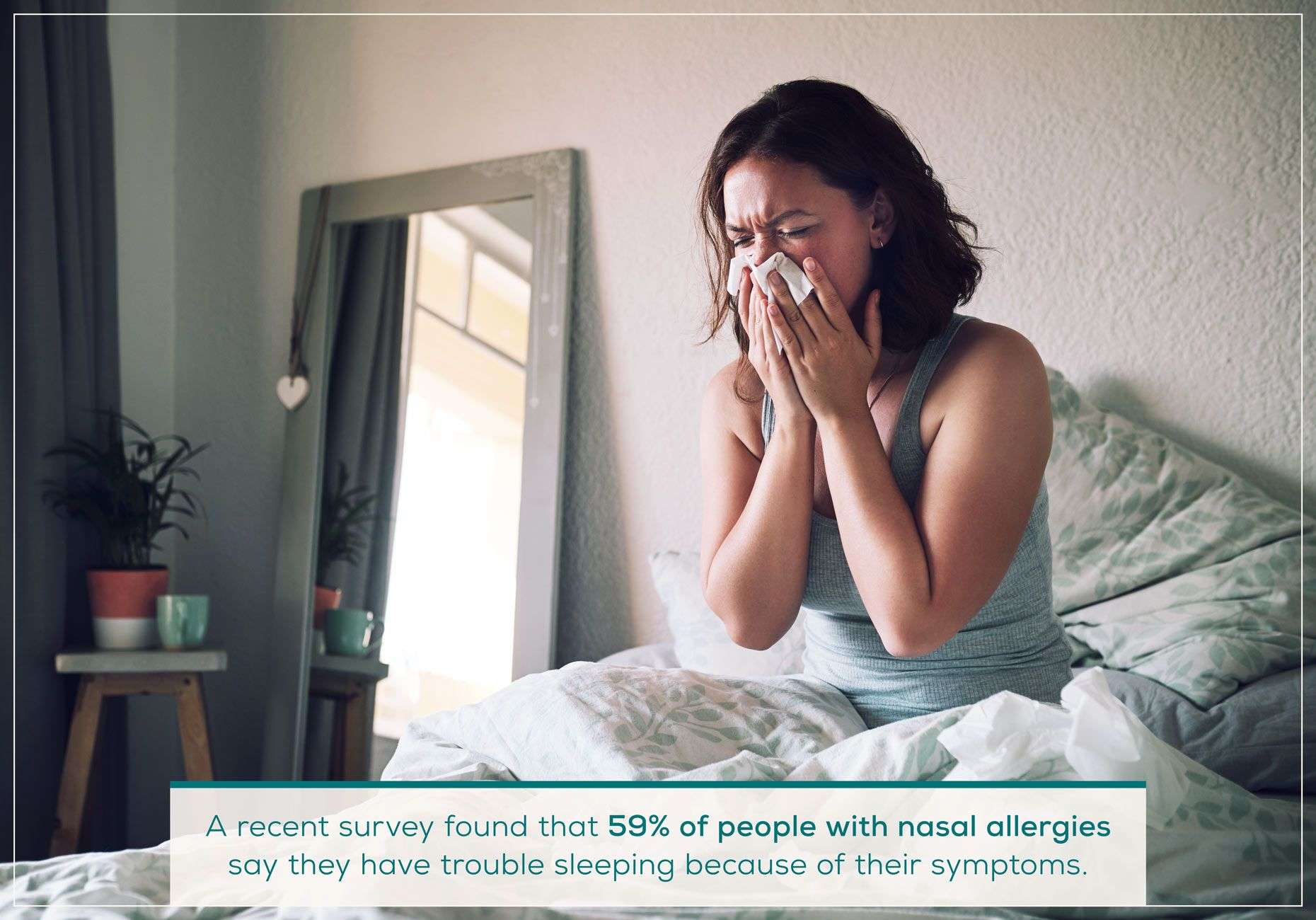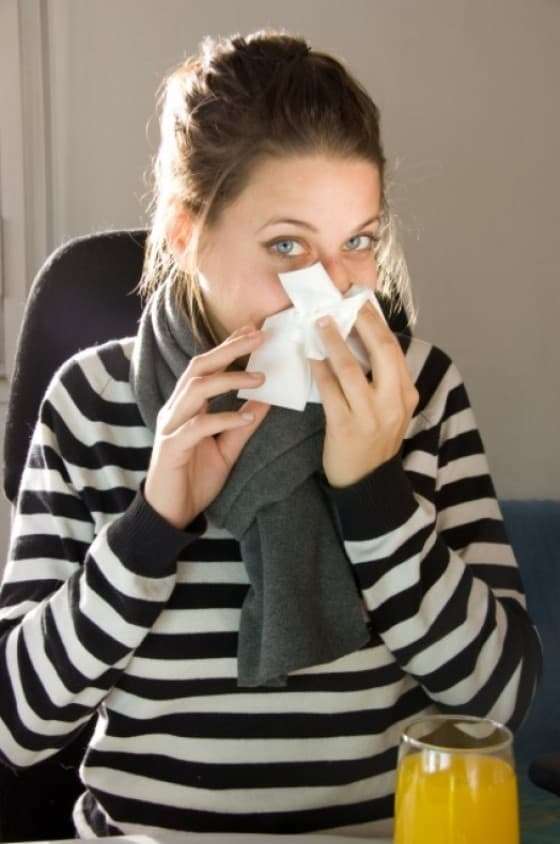What Causes This Fatigue
When you have an allergy to something, whats really happening is that your immune system is creating antibodies to fight an unknown object and releasing histamines while doing so. This causes the allergy symptoms we know all too well sneezing, watery eyes, itchy nose. Its no wonder that most people experiencing allergy symptoms get very poor sleep when all this inflammation causes nasal congestion. Congestion makes it very difficult to breathe, especially when lying down, which can really affect your ability to get a good nights sleep. Waking in the morning you may feel like you didnt sleep at all. This lack of sleep is important to address, which means tackling your allergies head on.
What Happens During An Allergic Reaction
When your immune cells encounter an allergen, they produce a type of antibody called gE antibodies. These antibodies activate the mast cells a type of white blood cell to release histamines. Histamines are the mediators of an allergic reaction that cause inflammation.
This exaggerated immune response in allergies brings about many cellular and chemical changes in the body that result in various symptoms.
How To Treat Allergy Fatigue
The brain fog and exhaustion of allergy fatigue can be frustrating, but they are not without solutions!
Before anything else, its advisable to talk to a physician or allergist to determine exactly what youre allergic to. Theyll likely perform an allergy test usually a blood or skin test to figure out exactly what triggers an allergic reaction in your system, so you can do your best to avoid that allergen.
Aside from avoiding your allergy, there are a number of other ways you can reduce allergy symptoms, and with them allergy fatigue.
1. Allergy Medication.
Several medications provide relief for allergy symptoms. Decongestants and nasal sprays can make it easier to breathe, and antihistamines help reduce allergy symptoms. Its important to remember that some antihistamines may make you drowsy, but that can actually be a plus if youre having trouble falling asleep! If youre trying to stay awake, non-drowsy allergy relief like Claritin or Zyrtec may be better options.
2. Try a Saline Wash.
Many people find that nasal irrigation using nasal flo or a neti pot helps clear sinuses and relieve congestion and headaches. If youre using a neti pot, be sure to clean it thoroughly between uses.
3. Ask your Doctor for an Allergy Shot.
4. Clean Up Around the House.
Don’t Miss: Loratadine Skin Allergy
What Causes Sinus Dizziness
Dizziness can be a symptom of nasal allergies. You get nasal allergies when your immune system mistakes certain substances called allergens for threats. When you encounter an allergen, your body releases histamines. Histamines help your body get rid of harmful substances, but they are an overreaction to an allergen. They cause symptoms like:
- Sneezing
Airborne allergies can cause a number of ear and sinus symptoms, including:
- Sinus congestion
- Inflammation of the lining of the eustachian tube, also called the auditory tube
The auditory tube normally equalizes the pressure in the middle ear. When it’s blocked by inflammation, pressure builds up. This is what makes your ears feel plugged. Sometimes, this can result in dizziness or balance problems.
Your allergy medication may cause dizziness as a side effect, too. It can also make you feel lightheaded. Most oral antihistamines can cause dizziness.
Dizziness is sometimes confused with vertigo or lightheadedness. Dizziness and vertigo are similar, but they are distinct symptoms. Dizziness is when you feel off-balance, while vertigo is the feeling that you or your surroundings are in motion. You can experience dizziness and vertigo at the same time.
These sensations are distinct from lightheadedness, which is a feeling like you might faint.
Are There Ways To Reduce Your Allergy Exposure

Here are several ways to minimize your exposure to seasonal allergies:
- Pay attention to daily pollen and mold spore levels, so you can avoid outdoor activities as much as possible when counts are high. To check out the American Academy of Allergy Asthma & Immunologys allergen tracker, .
- Begin taking medications before the start of the allergy seasonwhen pollen, grass, ragweed, or mold counts soar.
- Shut the windows and doors in your home, office, and car to seal out pollen.
- Wear a hat when outdoors or wash your hair before bed to keep pollen off your pillow and away from your face.
- Change your clothes after spending time outdoors to minimize your exposure to pollen. Studies show that half of the pollen that accumulates on clothing remains even if you try to shake or brush it off before you go indoors.
- Avoid mowing the grass or raking moldy leaves if those are your triggers, or wear a mask when doing so.
Read Also: Etiology Of Allergy
Dont Know How To Fix Your Allergy Fatigue Balloon Sinuplasty At Kaplan Sinus Relief Could Help
Can allergies cause fatigue? Yes. But does knowing that help you fix your allergy fatigue? Not really. And if your allergies havent responded to traditional treatments and are making you tired all the time, then a more strategic approach might be necessary.
At Kaplan Sinus Relief, we help you breathe freely again with procedures like ClariFix for chronic rhinitis and allergies and balloon sinuplasty.
Balloon sinuplasty, a non-invasive, in-office procedure that has provided patients with long-lasting results, and has become an increasingly attractive option for those suffering from allergy-related fatigue. During the procedure, your ENT uses a tiny to balloon to widen the nasal passageways, restore normal drainage, and help you breathe at night.
The best part? The procedure takes less than 20 minutes and most patients are back at work between 24 and 48 hours.
Kaplan Sinus Relief has been a pioneer for the balloon sinuplasty procedure. Our staff is here to answer any of your sinus questions and help you find relief. So, curious whether traditional sinus surgery helps allergies? Wondering if youre a good balloon sinuplasty candidate?
Request an appointment or call Kaplan Sinus Relief at 713-766-1818 today.
Other Helpful Articles by Kaplan Sinus Relief:
Why Allergies Make You Dizzy
Your Eustachian tubes are tiny tubes that connect your ears to your sinuses. They drain fluid and equalize the air pressure inside of your ears, which contributes to your sense of balance. They also lead to your vestibular system, located in your inner ear, which is responsible for sending your brain signals about balance.
It makes sense, then, that if your Eustachian tubes are swollen or blocked, you may start experiencing dizziness or vertigo. And what can cause your Eustachian tubes to become swollen or blocked? You guessed it: allergies.
Inflammation and mucus build-up in your Eustachian tubes is called Eustachian tube dysfunction. And though it doesnt always cause dizziness or vertigo, they can be among the symptoms.
When you have inflammation in the nose and sinuses, you can also have inflammation in and around the Eustachian tubes, which can cause those tubes to narrow, Dr. Aronica explains. Fluid can then build up behind the ear and impact the vestibular system, which can cause dizziness.
Recommended Reading: Robitussin Medication
Find Out What Youre Allergic To
In order to treat your allergies, you have to know what youre up against.
An allergy test can help identify substances that trigger allergic reactions in your body. These substances, known as allergens, can be things you breathe in, things you touch, or things you eat.
A skin prick allergy test involves exposing the skin on your arm or back to small amounts of allergens to then see what you react to. These tests are typically done in a single sitting, and youll get results right away.
A blood allergy test can also check for allergens and is useful if you take a medication that can interfere with results or if your doctor suspects you may have a severe allergic reaction to even a tiny amount of an allergen.
Allergies And Dizziness: The Cause And The Treatment
If youre feeling dizzy, you might be wondering whats causing it. Dehydration, medications, and a variety of conditions can cause you to feel dizzy and nauseated.
While dizziness might seem like a mild condition, it can actually be very disruptive to daily life. It can even be so severe that it leaves you stuck in bed for hours or days.
Dizziness can sometimes be caused by allergies.
An allergy is the immune systems response to a foreign substance thats not typically harmful to your body. These foreign substances are called allergens. They may include certain foods, pollen, or pet dander.
Allergy-related nasal and sinus congestion can lead to dizziness or a more severe type of dizziness called vertigo.
Recommended Reading: Can Allergy Medicine Cause Diarrhea
What If Your Dizziness Is Caused By Something Else
If a steroid nasal spray doesnt work, I encourage patients to follow up appropriately with their primary care physician or the doctor who referred them just to make sure were not missing something else, Dr. Aronica notes.
A number of other conditions can cause dizziness and vertigo, so if your allergies arent the culprit, you may need to see a neurologist or an otolaryngologist to figure out whats going on.
How Can You Treat Fatigue Caused By Allergies
The good news is there are many ways to get allergy relief so you can get rid of that looming, tired feeling. The first step in finding this relief is getting tested for allergies, so you know whats causing your symptoms. Then you can work together with your doctor to find an allergy treatment thats right for you.
You May Like: Peanut Allergy Kit Kat
How Allergies Can Cause Body Aches And Pain
When your immune system reacts to allergens, it triggers a process called an inflammatory response. This inflammatory response, or inflammation, is a vital defense mechanism in your body. For example, when you get injured and start bleeding, the inflammatory response brings cells to the affected area to help clot your blood and form a scab to begin the healing process.
However, when your body produces inflammation in response to an allergenmistakenly thinking it’s a threatit can cause annoyingsometimes life-threateningside effects.
During inflammation, chemicals are released by the immune system that bring white blood cells to the affected area to fight off the harmful substance. Pain can also be part of the inflammatory response. Some of the same chemicals that help fight off allergens also activate nerves in the body that causes pain in joints throughout your body.
What Causes Allergies Anyway

An allergic reaction is a chain reaction that starts in your genes and is expressed by your immune system, according to the American Academy of Allergy Asthma & Immunology .
When you have an allergy to something, like pollen or grass, your immune system views it as an invader . It then overreacts by producing antibodies called Immunoglobulin E , which travel to cells that release chemicals called histamines, Dr. Monteleone explains. Cue the stuffy nose, coughing, sneezing, and other uncomfortable symptoms.
You May Like: What Does Claritin Do For Allergies
Visit A Doctor For Worsening Symptoms
Although people may prepare for their allergy symptoms, it is sadly true that allergy can become worse. If you find that your chronic fatigue is getting worse along with your allergy, it is best to determine the cause with your doctor. Those people with a history of eczema, asthma, and recurring infections have more potential of getting risks in chronic fatigue. Have a regular check-up with your doctor about your allergy symptoms and how you can avoid your fatigue getting worse.
Allergies Affect People Day And Night
Chances are high that individuals with allergies know they have them. Theyll spend their days sneezing, coughing, and feeling congested. Typically, people realize how allergies affect themselves during the day. Not all sufferers recognize that allergies can worsen the quality of their sleep. The immune system targets allergens, and this frequent immune response disrupts the body in various ways.
Also Check: Zyrtec Allergy Reviews
How Do Allergies Affect Sleep
Allergens irritate your nasal passages when they enter your nose, triggering uncomfortable symptoms like nasal congestion, sneezing, and watery eyes. These symptoms affect your ability to breathe easily and tend to worsen at night two reasons why allergies commonly lead to poor sleep quality.
If your allergies keep you up at night, you may be missing out on sleep. Without a good nights sleep, you end up feeling tired and grumpy the next day. Being tired can impair your performance at school and work, negatively affecting your health and wellbeing. Poor sleep also heightens anxiety and stress response, which in turn, makes it harder to fall asleep.
Allergies dont just impact your ability to fall asleep they also interfere with your ability to stay asleep. People with allergies may wake up due to a congested nose, sneezing or coughing fit in the middle of the night. Over time, this kind of allergy-induced sleep deprivation adds up, creating a vicious cycle that leads some to rely on sedatives or alcohol to help them fall or stay asleep which is not a good idea.
So How Do Allergies Make You Tired
When battling with allergies, many chalk up their fatigue and low energy to stress and other factors. But the truth is, allergies contribute to fatigue in more ways than one.
1. Your Long-Term Immune Response is Exhausting You.
When your bodys in healing mode, it prioritizes its resources to bring you back to health. With short-term illnesses like colds or the flu, well typically feel tired for a few days and begin regaining energy as we start feeling better.
But with allergies, our immune system stays active for longer than its meant to, requiring more resources and energy to keep up the disease-fighting histamine and immunoglobulin E activity. As time stretches on, the inflammation meant to heal us can become chronic and lead to long-term fatigue resulting from diversion and depletion of your bodys energy.
2. Youre Breathing in Less Oxygen.
Stuffed noses and congestion make it harder to breathe and reduce your oxygen intake. With less oxygen comes less energy for our cells to refuel our bodies, making the impact of a long-term immune response even more exhausting on our systems.
3. Youre Not Sleeping Well.
Nasal congestion can make it uncomfortable, if not impossible to get a good nights sleep. In addition to our decreased oxygen intake, finding a comfortable position to fall asleep can feel like an infuriating pipedream. Sleep is a restorative process that keeps us healthy our health declines when were deprived of sleep, leaving us more and more fatigued.
Read Also: Twix Ingredients Allergy
Schedule An Appointment With An Allergist Expert
You dont have to lay in bed whenever allergic reactions strike you down. Manhattan Medical Arts have expert physicians on board who can help you curb your allergy symptoms and can also help you figure out what you may be allergic to. Schedule an appointment in order to visit our board-certified physician or receive medical consultation online.
What Exactly Is A Food Sensitivity/intolerance
A food sensitivity/intolerance is quite another story. Delayed reactions can appear in many different ways. They can affect any organ in the body and can take from 45 minutes to several days for symptoms to appear.
Food sensitivities can be an extremely difficult puzzle to try to solve on your own. This is due to the delayed onset of symptoms and complex bodily functions involved. In fact, food sensitivities often go undiagnosed or misdiagnosed. This makes them especially adept at being a hidden cause of fatigue!
When your body struggles to digest certain foods, ingredients or additives it may cause a food intolerance.
Symptoms of food intolerance include:
- Fatigue
- Headaches
- Irritability or nervousness
A food sensitivity or intolerance is caused by the IgG antibody. This is the most common antibody in your blood. It binds with viruses, bacteria, and fungi and help your body remove these harmful substances.
Food sensitivity tests measure the number of IgG antibodies your body develops after eating a particular food.
For example, you may not create any IgE antibodies to dairy products which means you are not allergic to dairy. However, you could produce IgG antibodies which shows that you are sensitive.
To further complicate matters, there are other antibodies that can be measured for food sensitivities. These include IgM and IgA. This means that your IgG antibodies might not react to dairy, but your IgA antibodies do.
Don’t Miss: Cleratin
Tips For Staying Alert
In treating allergies or a cold with antihistamines, you may experience drowsiness, a common side effect of the medication.
How does this happen? Histamine is a chemical produced by the immune system to fight off allergens and germs. When there is a threat of allergies or infection , histamine is even more active. In its search-and-destroy process, it can cause allergy or cold symptoms such as runny nose, coughing, sneezing and itch eyes. Antihistamine medications relieve these symptoms by blocking the unwanted effects of histamine.
Unrelated to the immune system, histamine is also produced in the brain, where it plays an important part in feeling awake. Antihistamines used to treat respiratory symptoms can get into the brain and interrupt this work, making you feel drowsy.
Treatment For Allergies And Dizziness

If you feel dizzy, the first thing you should do is sit or lie down somewhere safe. If you are taking allergy medication and are due for a dose, taking it now may help.
If you are not taking allergy medication or managing your allergies in other ways, you may find long-term relief from some of these common allergy treatments. See an allergist for help deciding which one is right for you.
Read Also: Childrens Clariton

